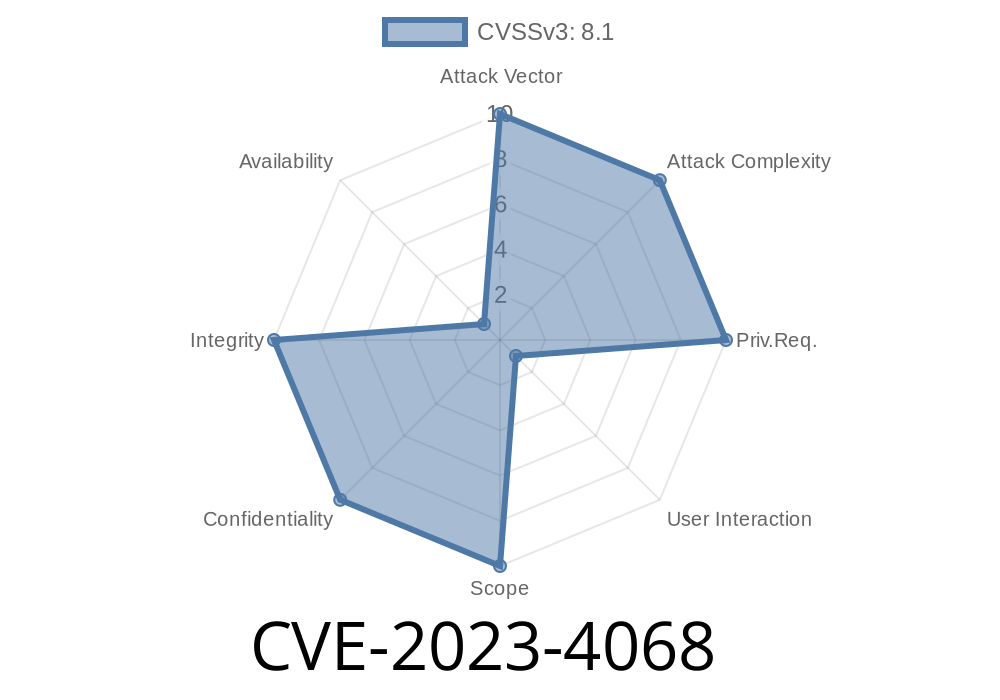In mid-2023, Google patched a serious bug in its Chrome browser (and other Chromium-based browsers) called CVE-2023-4068. This was a Type Confusion issue in V8, the browser’s JavaScript engine. The bug allowed remote attackers to perform arbitrary memory read and write via a malicious HTML page. If you’re interested in how such high-severity browser exploits work, and how attackers turn them into powerful hacking tools, this post is for you. We’ll break down the vulnerability, go through the exploitation process, and show some real code snippets.
---
What’s Type Confusion in V8?
In programming, “type confusion” happens when a piece of code assumes an object is one type, but it’s actually another. In C++-based engines like V8, that can let code access object fields incorrectly and even manipulate memory directly.
In the case of CVE-2023-4068:
A type confusion in V8’s JIT (“Just-In-Time”) compiler let attackers confuse value types, gaining powerful memory manipulation abilities.
> Severity: High
> Patch: Chrome 115..579.170
> References:
> - Official Chromium Issue (1497089)
> - Google Chrome Release Notes
---
Breaking Down the Bug
V8 relies on internal “maps” to track an object’s shape. These maps tell V8 if an object is, say, a Number array or an Object array. The JIT sometimes skips type checks for speed—but if it gets out of sync, it ends up treating an object as having a different shape than it really has. That’s where attackers strike.
Code tricks V8 into treating it as a different type (e.g., as an Object array).
- JavaScript code suddenly gets out-of-bounds read/write capabilities.
Example Exploit Code
Let’s look at a high-level proof of concept. This won’t break your browser, but it demonstrates the concept.
// Goal: Achieve arbitrary read/write via type confusion in V8 (CVE-2023-4068)
// Step 1: Create a JS array with double values (packed elements)
let arr = [1.1, 2.2, 3.3];
// Step 2: Craft a parallel object array for "confusion"
let objArr = [{}, {}, {}];
// Step 3: Corrupt V8 by mixing types (details omitted for brevity, in practice
// this requires triggering a JIT bug as found in CVE-2023-4068)
// Step 4: Use the bug to switch arr's map pointer to objArr's map,
// causing arr to be treated as object array
// Step 5: Now, use arr to read or write arbitrary memory addresses
// Pseudo-code to demonstrate the idea:
if (foundTypeConfusionBug()) {
// arr's elements now point to arbitrary objects or memory
console.log("[x] Arbitrary address read: ", arr[2]);
arr[1] = fakeObjectAtControlledAddress();
}
Note:
The real exploit is more complex, involving specific V8 internals and subtle JavaScript tricks. But the crux is: the attacker “confuses” the type of an array, and then reads/writes wherever they want.
Real-World Exploit Relevance
The impact is huge: Once arbitrary read/write is achieved, an attacker can escape the JavaScript sandbox, run native code, or dump secrets.
Proof of Concept in the Wild
Researchers (like Project Zero) and security experts often share real exploit writeups:
- Chromium Bug 1497089, now public
- V8 Exploitation Blogposts by Google
You’ll often see code like this in public write-ups, exploiting the same pattern:
Trick the engine into thinking the array stores objects.
3. Gain control of object pointers and read/write memory.
The Patch
Google fixed CVE-2023-4068 in Chrome version 115..579.170 and later, by tightening type checks and patching the JIT’s optimizations. Always update your browser!
Type confusion bugs in browser engines are extremely dangerous.
- Attackers leverage them for arbitrary memory read/write, usually leading to remote code execution (RCE).
References & Further Reading
- Official Chromium Issue 1497089
- Google Chrome Security Updates
- Google Project Zero: V8 Exploitation
- V8 GitHub Source
Stay Safe: Chrome updates quickly after bugs like these are reported—but you have to install the updates! For devs, always audit your JIT code and beware of type confusion bugs, especially in code that manipulates objects and arrays.
Timeline
Published on: 08/03/2023 01:15:00 UTC
Last modified on: 08/05/2023 04:15:00 UTC
